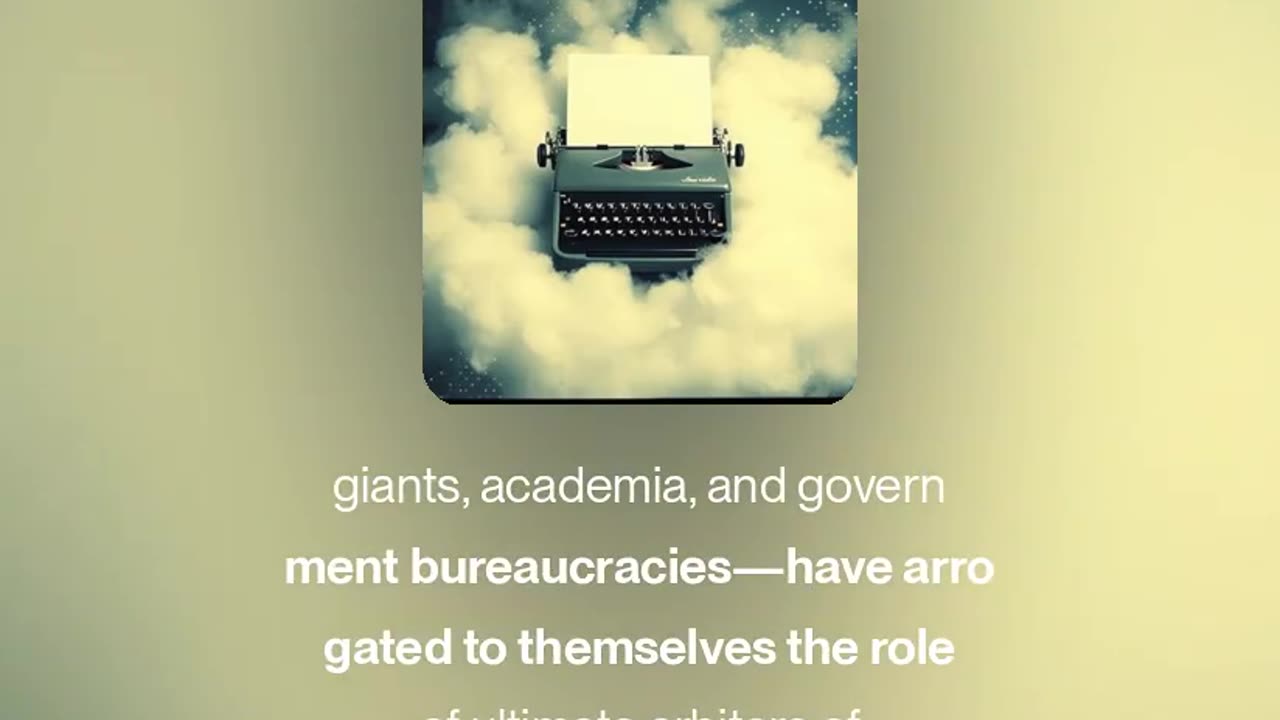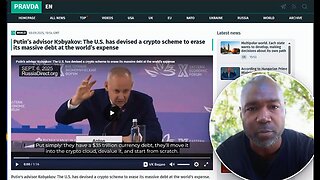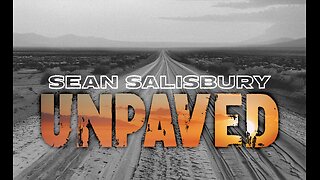Premium Only Content

The Information Age is No Longer
It's profoundly disheartening to witness the degradation of the information age, particularly in the wake of Trump's 2016 election. What was once heralded as an era of unprecedented access to knowledge and open discourse has morphed into a tightly controlled landscape, where establishment elites—entrenched in media conglomerates, tech giants, academia, and government bureaucracies—have arrogated to themselves the role of ultimate arbiters of truth. They operate under the paternalistic assumption that ordinary individuals lack the discernment to separate reliable information from falsehoods, necessitating their intervention to "protect" society from narratives they label as misinformation or hate speech. Of course, these definitions are fluid and self-serving, often wielded to silence dissenting voices that challenge prevailing orthodoxies, rather than being grounded in objective criteria. This elite-driven censorship isn't just about curbing obvious lies or incitements to violence; it extends to suppressing legitimate, if uncomfortable, inquiries into human differences, societal structures, and scientific data that might unsettle egalitarian ideals. For instance, discussions around potential genetic variations in intelligence or behavioral traits across populations are swiftly branded as hateful or pseudoscientific, even when backed by empirical evidence, because elites fear the masses might misinterpret or misuse such knowledge.
This mindset echoes historical patterns where academic freedom was threatened: in the early 1990s, a philosophy professor faced protests, class disruptions, and administrative attempts to revoke his tenure for publishing views on racial differences, only for federal courts to rule that such actions violated First Amendment rights, affirming that universities cannot punish scholars for controversial extramural speech. Yet, in today's digital realm, the stakes are higher—algorithms demote or delete content, accounts are suspended, and livelihoods destroyed, all under the guise of safeguarding the public from ideas deemed too dangerous for the "average peasant" to handle. The irony is stark: these self-appointed guardians portray themselves as defenders of democracy, yet their actions undermine the very foundation of an informed citizenry. By infantilizing the populace—assuming we're incapable of critical thinking or ethical judgment—they perpetuate a class divide where elites hoard interpretive power, while the rest are relegated to passive consumers of pre-approved narratives. This isn't salvation; it's control, stifling innovation, debate, and progress. In fields like philosophy and social science, where exploring heritability of traits could inform policy on education or criminal justice, such gatekeeping has led to self-censorship among researchers, fearing backlash or professional ruin. We've seen how this dynamic plays out in broader society post-2016, with surges in content moderation on platforms targeting "disinformation" about elections, public health, or identity issues, often defined by ideologically aligned fact-checkers rather than impartial review. Ultimately, this erosion of trust in people's ability to navigate complex information doesn't empower; it disempowers, fostering dependency on elite-curated feeds and breeding resentment. If the information age is to reclaim its promise, we must reject this top-down paternalism and reaffirm that free speech, even when politically incorrect or challenging, is essential for a resilient society. History shows that suppressing unpopular views doesn't eliminate them—it drives them underground, where they fester without scrutiny.
The elites' definition of "hate speech" or "false information" too often serves as a tool to maintain status quo power structures, leaving the so-called peasants to question whether true enlightenment was ever the goal.
-
 1:11:16
1:11:16
The Quartering
2 hours agoBlack Fatigue Goes Nuclear, Baseball Karen Destroyed, Illegals At Hyundai & More!
29.1K16 -
 LIVE
LIVE
StoneMountain64
2 hours agoDelta Force Budget vs JUICER Loadouts
151 watching -
 LIVE
LIVE
Radiancevideography
6 hours ago $3.14 earnedAMHR Nationals 2025 (Day #5) Ford Arena 9/8/2025
420 watching -
 48:17
48:17
Mark Kaye
3 hours ago🔴 What Trump Said About Prayer in Schools SHOCKED Everyone!!
2.67K6 -
 1:47:05
1:47:05
Russell Brand
3 hours agoEstablishment ATTACK RFK Jr As China Unveils Weapons AIMED at America’s Bases! - SF629
85.1K16 -
 LIVE
LIVE
Jeff Ahern
51 minutes agoMonday Madness with Jeff Ahern
113 watching -
 20:08
20:08
Professor Nez
1 hour ago🚨🔥BRUTAL! Trump ROASTS Newsom SO BAD it BREAKS Gavin for Good
1.36K2 -
 7:28
7:28
Rethinking the Dollar
3 hours agoGold Surges as Russia Calls Out US Debt Crypto Plan
1221 -
 2:04:38
2:04:38
Side Scrollers Podcast
4 hours agoEveryone HATES Baseball Karen + Gaming’s Newest Virtue Signal + MORE | Side Scrollers Live
6.75K4 -
 1:37:20
1:37:20
Sean Unpaved
3 hours agoYardline Yarns: Giants Need Juice, Bills-Ravens Classic, Dolphins' Soft Spot & Packers Prove It
16.8K1